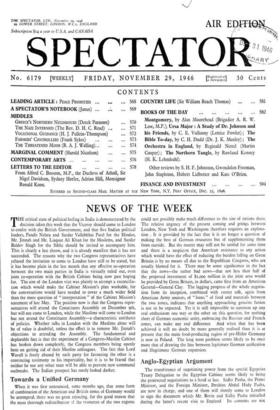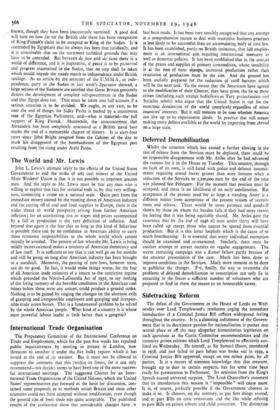Anglo-Egyptian Argument
The transference of negotiating power from the special Egyptian Treaty Delegation to the Egyptian Cabinet seems likely to bring the protracted negotiations to a head at last. Sidky Pasha, the Prime Minister, and the Foreign Minister, Ibrahim Abdul Hady Pasha, are now in charge, and one of them will shortly come to London to sign the document which Mr. Bevin and Sidky Pasha initialled during the latter's recent visit to England. Its contents are not
known, though they have been inaccurately surmised. A good deal will turn on how far on the British side there has been recognition of King Farouk's claim to be accepted as King of the Sudan. It is contended by Egyptians that he always has been that juridically, and it is conceivable that on the narrowest technical grounds that may have to be conceded. But between de jure and de facto there is a world of difference, and it is imperative, if peace is to be preserved and progress maintained in the Sudan, that no step shall be taken which would impede the steady march to independence under British tutelage. As an article by the secretary of the U.M.M.A., or inde- pendence, party in the Sudan in last week's Spectator showed, a large section of the Sudanese are satisfied that Great Britain genuinely desires the development of complete self-government in the Sudan and that Egypt does not. That must be taken into full account if a serious situation is to be avoided. We ought, in any case, to be near the end of things, for Sidky Pasha is backed by a unanimous vote of the Egyptian Parliament, and—what is material—the full support of King Farouk. Meanwhile, the announcement that Alexandria has been completely evacuated as a British naval base marks the end of a memorable chapter of history. It is sixty-four years since John Bright resigned from the Cabinet of the day to mark his disapproval of the bombardment of the Egyptian port resulting from the rising under Arabi Pasha.



































 Previous page
Previous page